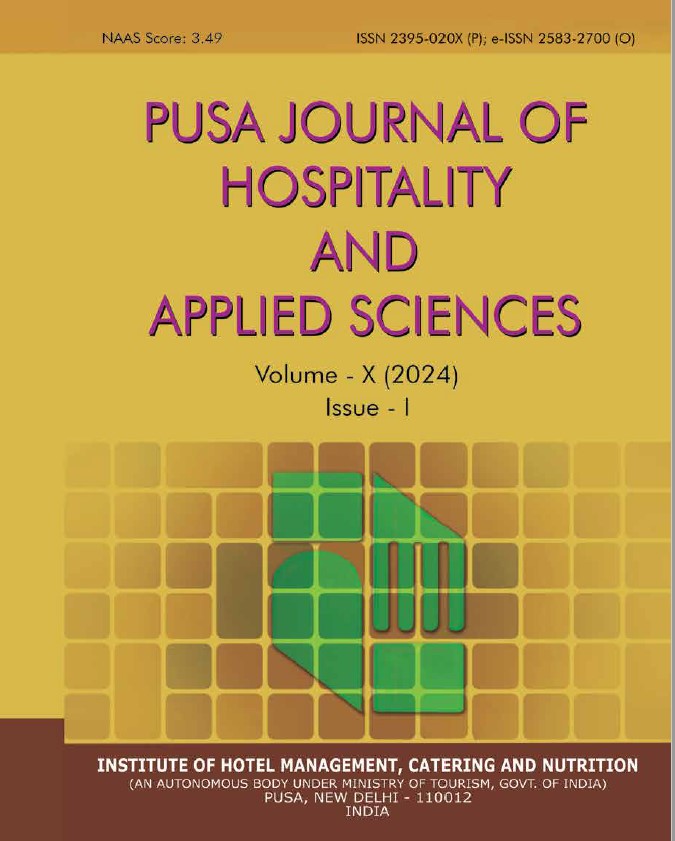Prevalence Of Mobile Learning Among The Hoteliers, And Its Benefits To The Hotels In Delhi Ncr
Keywords:
Mobile Learning, Augmented reality, Training MethodsAbstract
Background: With the change in time every generation has observed a change in the way learning took place, from the time when books were merely teachings written on dry leaves and learning and training took place in a bounded place , to the present where we have all advanced devices like Laptops, Projectors, Mobile phones etc. The technology, the present generation deals with, is not bound to space and time, learning is not confined to any specific place or location, and this has been possible by the introduction of a device known as Mobile phone. This research paper is focused on how Mobile learning came into existence, its significance as a new concept in hospitality and what are the basic problems with the traditional training systems, then how mobile devices can be used in learning, a glimpse of what augmented reality is and how the concept of mobile learning and augmented reality benefit the hotels. Objective: To sensitize the hotel employees about the concept ofmobile learning, how mobile learning can be used to train employees usingaugmented reality as a tool. Methodology: The study was done by circulating the questionnaire to 50 employees working in various departments of the hotels in Delhi and NCR through Google forms. Results: The employees (respondents) are now well aware and sensitized about the concept of Mobile Learning and Augmented Reality and also about how it can be beneficial for them as well as the industry. Conclusion: The study indicates that though the employees feel that the current learning methods used in their hotels are effective, but they also feel that Mobile learning can be introduced and implemented in their respective hotels as they find it very easy and convenient to learn things from mobile phones.
References
Ajzen, I. & Madden, T.J. (1986). “Prediction of goal-directed behavior from attitudinal and normative variables”, Journal of Experimental Social Psychology. 22, 453-74. 2. Bower, G.H. & Hilgard, E.R. (1981). Theories of Learning, Prentice-Hall, Englewood Cliffs, NJ. 3. Chen, Y.S., Kao, T.C. & Sheu, J.P. (2005). “Realizing outdoor independent learning with a butter fly-watching mobile learning system”, Journal of Educational Computing Research. 33, (4), 395- 417.
Crompton, H. (2013). A historical overview of mobile learning: Toward learner-centered education. In Handbook of mobile learning. 3-14.
Daze info, ‘Internet Users In India: 354M, 60% Access from Mobile Report– Daze info’. (2015) (2015, October 22).
History and future of mobile learning:http://www.educationalappstore.com/blog/history-future mobile-learning-part-1/. Retrieved November 10, 2017.
H.R Departments should push for mobile learning in their hotels. Retrieved November 13, 2017. http://ehotelier.com/insights/2017/03/08/hr-departments-push-mobile-learning-hotels/. 8. Jones,V. & Jo, J.H.(2004),“Ubiquitouslearningenvironment:anadaptiveteachingsystemusing ubi quitoustechnology”,inAtkinson,R.,McBeath,C.,Jonas-Dwyer,D.andPhillips,R.(Eds), Proceedings of the 21st ASCILITE (Australasian Society for Computers in Learning in Tertiary Education) Conference, Perth, Australia.
Li, L., Zheng, Y., Ogata, H. & Yano, Y. (2005), “A conceptual framework of computer supported ubiquitous learning environment”, Journal of Advanced Technology for Learning, 2 (4), 187-9. 10. Leung, H.C.& Chan, Y.Y. (2003), “Mobile learning: a new paradigm in electronic learning”, The Third Annual Meeting of the IEEE International Conference on Advanced Learning Technologies, Athens, Greece, July.
O’Malley, C., Vavoula, G., Glew, J.P., Taylor, J., Sharples, M. & Lefrere, P. (2003). ‘Guidelines for Learning/Teaching/Tutoring in a Mobile Environment. MOBIlearn project report, D4.1. 12. Pathak, T.(2015) ‘Market Monitor: Q1 2015: Handset & Smart phones India’. Counterpoint Technology Market Research. N., 2015. (2015 October 22).
Reid, R.D. & Sandler, M. (1992), “The use of technology to improve service quality”, The Cornell Quarterly, 33 (3), 68-73.
Telecom Regulatory Authority of India (TRAI), Highlights of Telecom Subscription Data as on 31st January, 2015. New Delhi: TRAI, (2015). (2015, October 22).
Ting, Y.R. (2005), “Mobile learning: current trend and future challenges”, Proceedings of the Fifth IEEE International Conference on Advanced Learning Technologies (ICALT), Houston, TX, USA, November 27-30.




